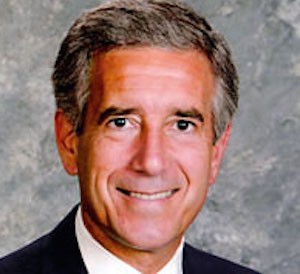Lauzen: Power-sharing ahead for Kane County Board
By Jean Lotus Staff Reporter — December 28, 2016Kane County government is going to make decisions as a “decentralized network” in 2017, according to Board Chairman Chris Lauzen. Lauzen said he’ll be taking a step back from the executive role and let 24 board members be in charge — and take responsibility for making decisions.
“I am very excited that the basic management structure of the day-to-day running of the county is being properly aligned with state statutes for the first time,” Lauzen said in an interview.
After pushing for more executive power in October, when Lauzen went head-to-head with States Attorney Joseph McMahon over allegedly authorizing the hiring of legal services without the state’s attorney’s approval, Lauzen backed off and said he’s moving to a more background role.
“To try to keep track of 12 standing committees, 14 chairs or co-chairs is, beyond my capacity,” Lauzen said.
It’s a situation that might be described as 24 bosses and one employee but Lauzen called himself “enthusiastic,” referring to his own role running board meetings.
“I’m delighted we have such dedicated and talented county board members,” Lauzen said. “Because they have the authority, they’re shouldering the responsibility.”
Kane County is the fifth largest in the state, with 1,300 employees and 532,000 constituents, Lauzen said. Board members receive a part-time salary and are eligible for state pensions if they work 600 hours per year on county business.
Lauzen made analogies to the Springfield model where county laws begin in one of 12 “standing committees” then are proposed to the finance committee, then make their way to the executive committee and then to the full board. The process takes about 30 days, Lauzen said. Lauzen, 63, an Aurora native, was a state senator in Springfield for 20 years before returning to chair the county board for two terms.
The Springfield analogy stops there, Lauzen said, because the board committee leadership is carefully divided up among Democrats and Republicans, as well as balanced by gender, and to some extent ethnicity, Lauzen said. “I’d like to think that’s my leadership,” he said.
Keeping the budget balanced and property taxes frozen will likely be the board’s goals – and biggest challenges — for 2017, as it has been in the past, Lauzen said.
The county’s equalized assessed value (EAV) of property has dropped, making property tax levies fall.
“We’re holding the line, so we don’t have a lot of money hanging around,” Lauzen said. “Our property tax payers expect us to live within our means without asking for more.”
Kane Co. is leading the way in transparency, Lauzen said, with all county finances posted online at the www.kanecountyil.opengov.com website.
While not actively seeking consolidation of local taxing bodies, Lauzen said tax savings are realized after the elimination of Otter Creek water treatment district, which was located entirely within South Elgin. He also said a Naperville Township road district may consolidate with a city road district to streamline services.
Lauzen said he has been proud the county took pro-active steps to pre-pay pension obligations twice. In 2017, those prepayments may be leveraged even more by issuing a proposed pension obligation bond that could save between $24-$32 million dollars in debt service fees. Lauzen emphasizes the county would not be borrowing to pay current obligations, but refinancing future obligations at a lower interest rate. That’s going to be something for the finance committee to determine, Lauzen said. The finance committee will also take the heat for budget cuts that caused friction with the board from the county Sheriff’s, Coroner’s and State’s Attorney’s departments, which all had requests for staffer increases last year.
The Longmeadow Parkway Bridge Corridor project finally got underway in spring of 2016, Lauzen said. The five-mile, four-lane county highway will link Barrington Hills and Algonquin with a toll bridge over the Fox River. The project depends on $14.5 million from the federal government, $40 million from the state of Illinois, and $61.1 million in local Kane County funds, according to the county’s website. Of the county’s portion, around $30 million will be collected from 75-cent tolls on the bridge.
Newly elected board member Jarett Sanchez, from Carpentersville, worked for two years with a group that opposes the parkway, Sanchez said.
“Some people are concerned about environmental issues, and some are worried about property values and quality of life,” Sanchez said. “There’s a neighborhood in Algonquin where the back yards of the houses will be 70 feet from the center of the road. People are worried that their children will be disrupted while playing and there will be more air pollution,” Sanchez said. “There’s a long history of people trying to fight [the project.]”
Sanchez now serves on the transportation standing committee.
“We had our first meeting and I tried to table some of the votes on the project. I didn’t get a second, but I knew that would happen,” he said. “At least I’m representing the opinions of the voters.”
Some board members have worried the state’s contribution may not come through because of the Illinois budget crisis, Lauzen said. “I’m confident the state money will come through,” Lauzen said.
— Lauzen: Power-sharing ahead for Kane County Board —








